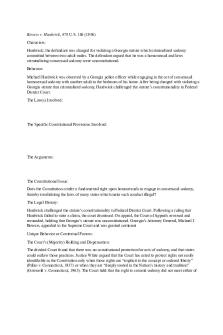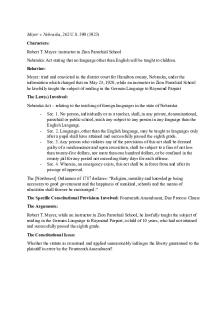Briefs week 2 - Brief for Marsh v. Alabama case, including notes on interpretation. mandatory PDF

| Title | Briefs week 2 - Brief for Marsh v. Alabama case, including notes on interpretation. mandatory |
|---|---|
| Author | Bill Rein |
| Course | Constitutional Law: Civil Rights and Civil Liberties |
| Institution | California State University Chico |
| Pages | 2 |
| File Size | 61.3 KB |
| File Type | |
| Total Downloads | 35 |
| Total Views | 133 |
Summary
Brief for Marsh v. Alabama case, including notes on interpretation. mandatory assignment by week...
Description
Bill Rein POLS 451B 8.26.2017 Marsh v. Alabama (1946) FACTS Chickasaw was a privately-owned, “company town” in Alabama: a ship-building company owned the title to the town and paid for law enforcement. A Jehovah’s Witness, Grace Marsh, visited the town and distributed religious fliers. She was told she required a permit, but denied this. Then she was told to leave the sidewalk and/or desist passing out fliers, but refused, and was arrested and tried for trespassing on private property. ISSUE Are citizens protected under the First and Fourteenth Amendments for freedom of speech under state jurisdiction in a private town? HOLDING Yes. The court sided with Grace Marsh over the ship-building company. REASONING Justice Hugo Black wrote for the 5-3 majority that the way citizens functioned under the private town was similar enough to the way citizens operate under the state that the distinction was not legally tenable and Marsh’s rights were violated. The protection of property rights was weighed against free speech and religious liberty. Justice Reed wrote the dissent, arguing that religious liberty and free speech concerns are not absolute in the Constitution but protected under specific circumstances not satisfied in Marsh .
Bill Rein POLS 451B 8.26.2017 Burton v. Wilmington Parking Authority (1961) FACTS A restaurant in Delaware refused to serve a male customer, William Burton, solely on the basis that he was a “Negro.” The private Eagle Coffee Shoppe was operating alongside and with the Wilmington Parking Authority which was funded by the state of Delaware. The Parking Authority was partially funded by the public and was built to facilitate parking for the city. Burton filed suit under the right to Equal Protection. The Delaware Supreme Court reversed the injunction granted by the lower court. ISSUE Were Burton’s rights to Equal Protection under the Fourteenth Amendment violated when the Coffee Shoppe refused to serve him based on his race? HOLDING Yes. The Supreme Court granted the injunction. REASONING Justice Tom Clark wrote for the majority 6-3 opinion that the Shoppe, received funding from the state, violated Burton’s rights. “The restaurant is operated as an integral part of a public building” which sustains the role of a public service as receives taxpayer funding. The Shoppe could not be separated meaningfully from the public building it was partially operated by. Therefore the state “made itself a party to the refusal of service.”...
Similar Free PDFs

Case Brief 6 - Powell v. Alabama
- 1 Pages

Powell v. Alabama
- 1 Pages

Marsh Case Study Final
- 2 Pages

Victory Briefs Debate brief
- 127 Pages

CPC Notes Endterm - Case Briefs
- 25 Pages

Lubitz v Wells Case Brief Notes
- 2 Pages

Week 3 Notes including s109
- 8 Pages
Popular Institutions
- Tinajero National High School - Annex
- Politeknik Caltex Riau
- Yokohama City University
- SGT University
- University of Al-Qadisiyah
- Divine Word College of Vigan
- Techniek College Rotterdam
- Universidade de Santiago
- Universiti Teknologi MARA Cawangan Johor Kampus Pasir Gudang
- Poltekkes Kemenkes Yogyakarta
- Baguio City National High School
- Colegio san marcos
- preparatoria uno
- Centro de Bachillerato Tecnológico Industrial y de Servicios No. 107
- Dalian Maritime University
- Quang Trung Secondary School
- Colegio Tecnológico en Informática
- Corporación Regional de Educación Superior
- Grupo CEDVA
- Dar Al Uloom University
- Centro de Estudios Preuniversitarios de la Universidad Nacional de Ingeniería
- 上智大学
- Aakash International School, Nuna Majara
- San Felipe Neri Catholic School
- Kang Chiao International School - New Taipei City
- Misamis Occidental National High School
- Institución Educativa Escuela Normal Juan Ladrilleros
- Kolehiyo ng Pantukan
- Batanes State College
- Instituto Continental
- Sekolah Menengah Kejuruan Kesehatan Kaltara (Tarakan)
- Colegio de La Inmaculada Concepcion - Cebu








